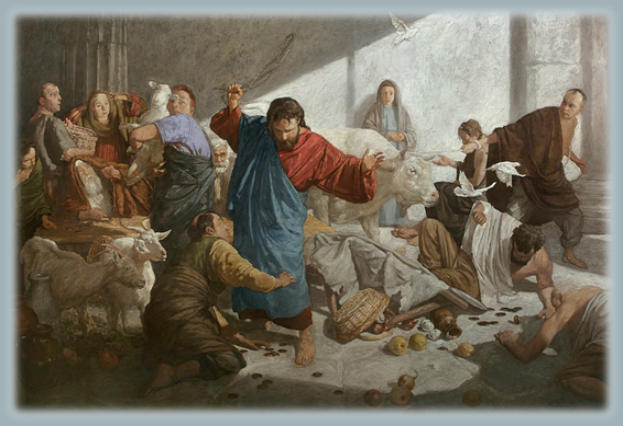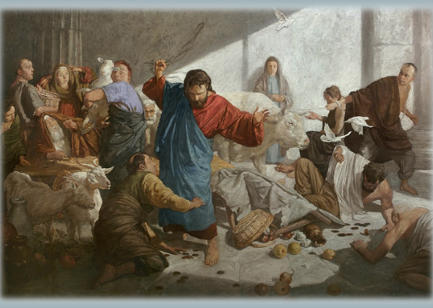The “Un-Jesus” Jesus
The
Gospels
sometimes
present
Jesus
in
a
way
which
jolts
the
popular
image
of
the
mild,
gentle,
endlessly
tolerant
concept
some
have
of
Him.
Perhaps
the
most
conspicuous
example
of
this
is
the
story
of
His
cleansing
of
the
temple.
Jesus
actually
cleansed
the
temple
twice,
at
the
beginning
of
His
ministry
(Jn.
2:13-22)
and
then
at
the
end
(Mk.
11:15-18).
These
were
rather
physical,
if
not
violent,
events,
with
Jesus
driving
out
the
sheep
and
cattle
along
with
their
sellers.
He
also
overturned
the
tables
of
the
moneychangers
and
the
chairs
of
those
selling
doves.
John
(2:15)
even
represents
Him
as
making
a
scourge
to
drive
them
all
out.
He
rebuked
them
for
turning
what
was
to
be
“a
house
of
prayer,” into a market and a robbers’ den.
What
makes
all
of
this
more
remarkable
is
that
these
activities
were
not
wrong,
per
se.
Indeed,
the
selling
of
the
animals
was
meant
to
be
a
service
to
those
who
wished
to
buy
them
to
offer
sacrifices
without
having
to
travel
with
them
to
Jerusalem.
Likewise,
the
moneychangers
offered
to
exchange
the
coins
of
those
who
had
to
pay
their
temple
taxes
into
acceptable
ones
for
that
purpose.
Furthermore,
this
was
not
the
temple
itself
or
its
inner
courtyard
where
the
priests
ministered.
Rather,
this
was
apparently
the
largest
and
outermost
of
the
temple
courts,
where
various
temple-related
activities
were
allowed
to
take
place,
whether
worship,
teaching,
or
business.
It
was
called
“the
court
of
the
Gentiles,” because even they were allowed to enter it.
Why,
then,
was
Jesus
so
offended
by
the
activities
of
the
moneychangers
and
merchants?
Why
did
He
even
forbid
those
carrying
goods
to
use
it
to
ease
their
burdens
by
taking
a
shortcut
through
this
outermost
courtyard
to
their
destinations (Mk. 11:16)?
While
this
temple
courtyard
was
not
the
temple
itself,
it
had
been
set
aside
and
provided
for
spiritual
pursuits.
Thus,
the
temple
at
its
center
—
that
which
drew
the
reverent
to
this
place
—
had
conveyed
its
sanctity
to
these
adjoining
precincts,
just
as
the
temple
had
conveyed
sanctity
to
its
gold
(cf.
Matt.
23:17).
Yet,
the
merchants
and
moneychangers
distracted
the
worshippers
who
came
to
the
temple
and
diverted
its
very
purpose
to
that
of
an
economic
enterprise.
One
can
imagine
the
assault
on
the
senses
created
by
the
noise
and
odors
of
all
the
animals,
and
even
the
dung
they
dropped,
so
that
the
atmosphere
of
what
was
supposed
to
be
devoted
to
making
a
suitable
place
for
people
to
find
the
tranquility
to
pray,
learn,
and
meditate
about
higher
matters
had
been
fundamentally
changed.
Indeed,
the
purpose
of
the
place
had
been
so
perverted
into
that
of
a
common
place
that
some
thought
nothing
of
walking
through it for no better reason than their convenience.
This
is
a
reminder
that
Jesus
is
more
than
what
popular
opinion
makes
Him.
Instead,
He
cares
about
the
“little
things,”
such
as
a
woman
taking
a
shortcut
through
the
temple
area
with
a
jug
of
water.
This
is
because
the
“little
things” often foster the “big things” (Lk. 16:10).
Idolatry
attracted
adherents
because
it
allowed
them
to
decide
what
they
wanted
their
gods
to
be.
Hence,
it
is
an
insidious
form
of
idolatry
for
people
to
see
Jesus
only
as
they
wish.
Many
create
a
distorted
picture
of
Jesus
by
selecting
out
of
Scripture
those
images
they
prefer
and
neglecting
the
opposite
ones
of
the
“Un-Jesus”
they
dislike.
Yet,
no
one
gets
to
accept
Jesus
only
on
the
terms
they
like.
He
must
be
accepted
in
His
totality,
or
not
at
all.
To
be
deceived
into
thinking
otherwise
will
only
lead
to
a
very
unpleasant
surprise.
“Do
homage
to
the
Son,
lest
He
become
angry,
and
you
perish
in
the
way,
for
His
wrath
may
soon
be
kindled …” (Psa. 2:12).
“…
And
He
entered
the
temple
and
began
to
cast
out
those
who
were
buying
and
selling
in
the
temple,
and
overturned
the
tables
of
the
moneychangers
and
the
seats
of
those
who
were
selling
doves;
and
He
would not permit anyone to carry goods through the temple” (Mark 11:15,16).


By Andrey Mironov 777 - Own work, CC BY-SA 4.0, https://commons.wikimedia.org/w/index.php?curid=24847288
The “Un-Jesus” Jesus
The
Gospels
sometimes
present
Jesus
in
a
way
which
jolts
the
popular
image
of
the
mild,
gentle,
endlessly
tolerant
concept
some
have
of
Him.
Perhaps
the
most
conspicuous
example
of
this
is
the
story
of
His
cleansing
of
the
temple.
Jesus
actually
cleansed
the
temple
twice,
at
the
beginning
of
His
ministry
(Jn.
2:13-22)
and
then
at
the
end
(Mk.
11:15-18).
These
were
rather
physical,
if
not
violent,
events,
with
Jesus
driving
out
the
sheep
and
cattle
along
with
their
sellers.
He
also
overturned
the
tables
of
the
moneychangers
and
the
chairs
of
those
selling
doves.
John
(2:15)
even
represents
Him
as
making
a
scourge
to
drive
them
all
out.
He
rebuked
them
for
turning
what
was
to
be
“a
house
of
prayer,”
into
a
market
and a robbers’ den.
What
makes
all
of
this
more
remarkable
is
that
these
activities
were
not
wrong,
per
se.
Indeed,
the
selling
of
the
animals
was
meant
to
be
a
service
to
those
who
wished
to
buy
them
to
offer
sacrifices
without
having
to
travel
with
them
to
Jerusalem.
Likewise,
the
moneychangers
offered
to
exchange
the
coins
of
those
who
had
to
pay
their
temple
taxes
into
acceptable
ones
for
that
purpose.
Furthermore,
this
was
not
the
temple
itself
or
its
inner
courtyard
where
the
priests
ministered.
Rather,
this
was
apparently
the
largest
and
outermost
of
the
temple
courts,
where
various
temple-related
activities
were
allowed
to
take
place,
whether
worship,
teaching,
or
business.
It
was
called
“the
court
of
the
Gentiles,”
because even they were allowed to enter it.
Why,
then,
was
Jesus
so
offended
by
the
activities
of
the
moneychangers
and
merchants?
Why
did
He
even
forbid
those
carrying
goods
to
use
it
to
ease
their
burdens
by
taking
a
shortcut
through
this
outermost
courtyard
to
their
destinations (Mk. 11:16)?
While
this
temple
courtyard
was
not
the
temple
itself,
it
had
been
set
aside
and
provided
for
spiritual
pursuits.
Thus,
the
temple
at
its
center
—
that
which
drew
the
reverent
to
this
place
—
had
conveyed
its
sanctity
to
these
adjoining
precincts,
just
as
the
temple
had
conveyed
sanctity
to
its
gold
(cf.
Matt.
23:17).
Yet,
the
merchants
and
moneychangers
distracted
the
worshippers
who
came
to
the
temple
and
diverted
its
very
purpose
to
that
of
an
economic
enterprise.
One
can
imagine
the
assault
on
the
senses
created
by
the
noise
and
odors
of
all
the
animals,
and
even
the
dung
they
dropped,
so
that
the
atmosphere
of
what
was
supposed
to
be
devoted
to
making
a
suitable
place
for
people
to
find
the
tranquility
to
pray,
learn,
and
meditate
about
higher
matters
had
been
fundamentally
changed.
Indeed,
the
purpose
of
the
place
had
been
so
perverted
into
that
of
a
common
place
that
some
thought
nothing
of
walking
through
it
for
no
better
reason than their convenience.
This
is
a
reminder
that
Jesus
is
more
than
what
popular
opinion
makes
Him.
Instead,
He
cares
about
the
“little
things,”
such
as
a
woman
taking
a
shortcut
through
the
temple
area
with
a
jug
of
water.
This
is
because
the
“little
things” often foster the “big things” (Lk. 16:10).
Idolatry
attracted
adherents
because
it
allowed
them
to
decide
what
they
wanted
their
gods
to
be.
Hence,
it
is
an
insidious
form
of
idolatry
for
people
to
see
Jesus
only
as
they
wish.
Many
create
a
distorted
picture
of
Jesus
by
selecting
out
of
Scripture
those
images
they
prefer
and
neglecting
the
opposite
ones
of
the
“Un-Jesus”
they
dislike.
Yet,
no
one
gets
to
accept
Jesus
only
on
the
terms
they
like.
He
must
be
accepted
in
His
totality,
or
not
at
all.
To
be
deceived
into
thinking
otherwise
will
only
lead
to
a
very
unpleasant
surprise.
“Do
homage
to
the
Son,
lest
He
become
angry,
and
you
perish
in the way, for His wrath may soon be kindled …” (Psa. 2:12).
“…
And
He
entered
the
temple
and
began
to
cast
out
those
who
were
buying
and
selling
in
the
temple,
and
overturned
the
tables
of
the
moneychangers
and
the
seats
of
those
who
were
selling
doves;
and
He
would
not
permit
anyone to carry goods through the temple” (Mark 11:15,16).
By Andrey Mironov 777 - Own work, CC BY-SA 4.0,
https://commons.wikimedia.org/w/index.php?curid=24847288


Copyright © 2017 - current year, Gary P. and Leslie G. Eubanks. All Rights Reserved.











